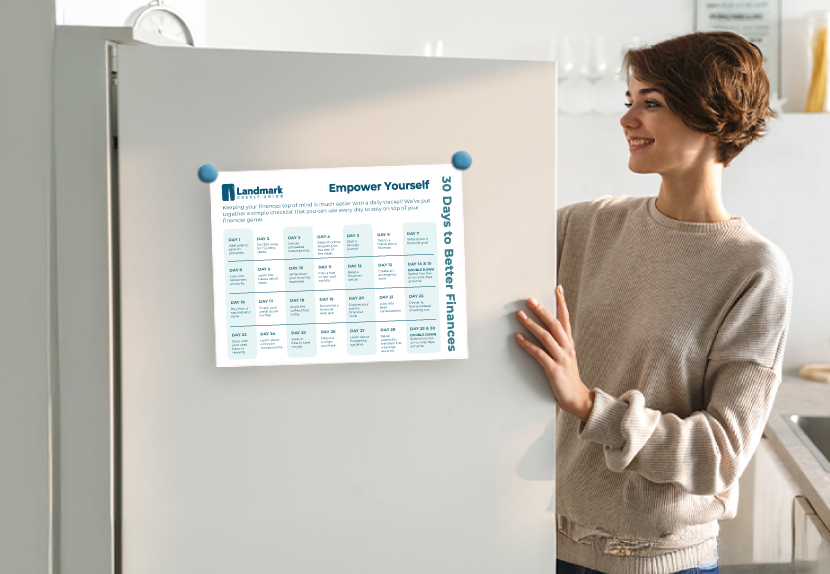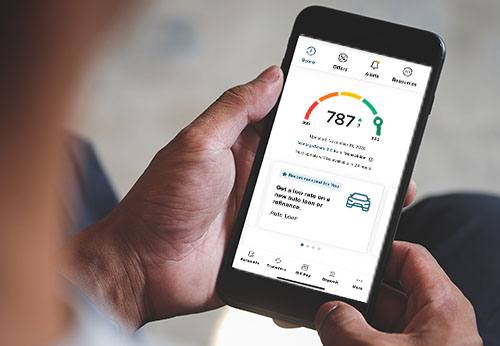
Let’s Break it Down
Understanding your finances can seem like a daunting task, but with the proper stepping stones you can be your own financial pro! Whether it’s questions about homebuying, budgeting, or managing your credit, we’re ready to lend a hand.
Find the perfect place to start with our resources below.
-
Budgeting and Saving:
Budgeting and saving can be easier than you think. We can show you how to plan for your financial goals in a way that works for you.Learn More -
Learning Center:
Expand your financial smarts with our free online courses. Knowledge is power after all, start learning today.Learn More -
Boost Credit Scores:
Understand how your credit score is calculated and explore ways to raise it over time.Learn More
-
Savings Accounts:
Build your savings with competitive rates and great returns. Start on the right track with a Landmark savings account.Learn More -
Keys to Homebuying:
Ready to buy a new home? Learn the step-by-step homebuying process from our experienced loan officers.Learn More
Reduce Your Student Debt
It’s never a bad time to look over your student loans. Whether you’re just starting to pay off your debt, or you want to speed up the process to get out of debt faster, we have tips to help!
Quick Payment Tips
- Extra Payments on Principal: Make additional payments solely on your principal balance. This can drastically reduce the time it takes to pay off a loan if done consistently.
- Biweekly Payments: Pay half your bill every two weeks. You’ll end up making an extra payment each year, taking time off your repayment.
- Refinance: If you have a steady job, good credit and the loan in question is a private loan, you can refinance to reduce interest and duration. When you reduce the term length of a loan this usually comes with a higher monthly payment. Making less payments at a higher amount will reduce the total number of payments needed to pay it off.
- Interest Only Payments: If you’re still in school you can pay down the interest that is accruing while in forbearance. Forbearance means you’re temporarily postponing your loan payments. It’s a temporary pause, not a forgiveness of debt. This will prevent your interest from capitalizing, and you’ll have less to pay back when you enter the payment period.
- Grace Period or Forbearance: If you have fallen on hard times or have trouble finding a job after school, reach out to your loan provider for assistance. It won’t hurt to ask for an extended grace period or forbearance before having to make payments on your loan.
Explore Different Angles
Your current repayment plan might not be the best fit anymore. The one you originally set up or the plan that was automatically put in place, after starting repayment may not work for your situation. For most student loans, you can reach out to your loan provider to discuss other options if needed.
This may not help you repay your loan faster, but the last thing you want is to be in a situation where you can’t afford your monthly payments. Sometimes making a temporary change to get back on track is the best course of action. Once you’re comfortable with a higher payment again, switch back to your original plan and crush your payment goals!
Balancing and Saving
Time to get in a budgeting and saving mindset. Getting into this habit and learning how to save is a great step when repaying your debts. It will also set you up for long-term success! Figure out what you owe, and make your student loan repayment part of your monthly budget. Remember, building a savings account while paying off loans is just as important as budgeting.
We have plenty of savings tips and budgeting systems on this page to help you out. Check them out so you can build confidence in your savings while also paying off debt.

Your Top Auto Questions Answered
Time to boost your car buying knowledge! The car buying process can have a lot of moving parts, but here’s some good news: We sat down with our local expert to get answers on the most important topics.
Check out the interview and get an inside scoop on the following subjects:
- What is a car loan?
- Buying vs. leasing
- When to start looking
- Choosing a loan term
- Down payment impact
Top Ways to Start Saving
Want to see your favorite band or go on vacation without worrying about your bank account? Take advantage of these three savings tips to reach your goals or eliminate debt faster. Let us help you raise to the challenge of adding money to your savings with consistency. While there are plenty of simple ways to save daily, these three steps can provide that initial boost to your new savings mindset.
Set up accounts for specific saving buckets like rent, fun or a new car. Creating a separate account for a specific savings goal helps keep a constant eye on your progress. Learning how to move your money around with separate accounts creates a positive financial habit and can keep your goal top of mind.
Use our budgeting systems to help eliminate credit debt or student loans. Eliminating debt is one of the best ways to increase the amount you save every month. The best part is, there are plenty of unique budgeting strategies available for you to try out! Check out some of the suggested budgeting strategies below, and find the one that works the best for you.
Schedule recurring transfers from your checking account to your savings account each month. When you automate your cashflow, you can pull money from your paychecks without having to even think about it. Create an “out of sight out of mind” style of saving for your goals.
Simple Ways to Save Every Day
It’s time to shift your mindset from spending to saving! You don’t always need a specific account type to provide a significant boost to your savings. You can save a lot more than you think by making simple adjustments to your everyday life. To start, try creating a basic savings account in Digital Banking specifically for you vacation or emergency fund goal. Next, use tips like these to save you money on a daily, weekly or monthly basis.
-
Start Setting Goals
Keep things simple, smart and effective. Try making daily or long-term savings goals to keep your mind on a savings track.
-
Make Coffee at Home
Buying coffee is a luxury that we all fall into. Did you know that you can save hundreds a year by making coffee at home? Try reducing the amount of coffee you buy in the morning, and the amount you go out to lunch or dinner.
-
Learn to Say No
Practice standing your ground to stop unnecessary spending habits. Normalize living within your means and establish “wants” versus “needs.”
-
Be a Budget Hero
Research, find a plan that works for you and stay on track with a budget. Without a budget, most of your saved funds could end up being accidentally spent.
-
Stop Subscription Creep
We often sign up for free trials and forget to cancel before the charges happen. Make sure you’re only paying for subscriptions that you use.
Saving for Vacation
Vacation memories shouldn’t come with financial stress. Here’s how to make smart preparations, stay on budget and get the most value from your getaway.
Plan, plan and plan some more! One of the best ways to avoid unnecessary expenses on vacation is to plan ahead. Putting in the effort to research the specifics of your vacation spot can help get the most out of your days without having to worry about last-minute expenses or unforeseen situations. Address the following before booking your next trip.
- Best time to visit
- Local weather
- Travel insurance
- Transportation options
- Local customs
While we encourage you to take a load off once you arrive at your destination, keep a budget in the back of your mind. If you can, try to stick to a daily budget so you don’t overspend or impulse buy. The last thing you want to do is to use up all the money you saved in one day.
What’s better, packing the car for a family road trip or soaring through the sky to your destination? Whatever you choose, make sure you consider the possible costs. Buying a plane ticket may look like a big expense, but a 20-hour drive may end up costing more. When you add up the cost of gas, snacks, tolls and a possible overnight stay, you may end up spending more on the road than on a flight ticket. Try a few of these road trip tips to save you money:
- Calculate mileage to manage the cost of gas
- Prep snacks and meals before leaving
- Swap drivers to skip hotels
- Put money on an E-pass or pay tolls online to avoid toll lines
- Do some car maintenance before leaving
The two biggest costs when it comes to vacations are usually flights and hotel stays. Knowing the best time to book a flight or hotels is just as important as shopping for the best price. There are plenty of sites, apps or articles out there that can help you save money on flights or hotel prices. To get you started, here are a few common tips to help you save in the long run.
Hotel Saving Tips
- Book with a hotel directly instead of a discount site
- Steer clear of peak days like Fridays for check-in or Sundays for check out
- Booking stays on Monday and Tuesday are often cheaper
- Booking the day before, for short trips often has reduced prices
- Use the rewards points you get from a Landmark Rewards Credit Card
Flight Saving Tips
- Departing Monday, Tuesday or Wednesdays are usually cheaper than weekends
- Flights with layovers can be as much as 20% cheaper
- Consider multiple airports when searching
- Use a price tracker

30 Days to Financial Wellness Calendar
Keeping your finances top of mind is much easier with a daily tracker! Get a free copy of our 30-day savings and wellness calendar. Plus, we’ve recently updated our calendar with tips and tricks directly from our members!
Using Credit Cards Wisely
A credit card is a great tool to have for your financial needs. They can be used to build your credit score, for travel benefits and more. Just be cautious if you are using one for all your expenses.
It’s easy to create a pile of debt with credit card purchases, interest and fees. Learning to use your credit card responsibly is an important skill so you don’t end up with debt you can’t afford to pay back. Lookout for the following pitfalls when using your credit cards.

-
If you use your card for everyday spending, you can use features like auto pay to make sure you never miss a payment. When you pay your balance in full each month you can maximize the benefits and protections that come along with your credit card. Keep in mind, missing payments can negatively affect your credit score.
-
Live within your means and purchase what you can afford. Be smart about your spending habits, and never spend up to your limit. Just because you have access to more money, does not mean you should use all of it. If you have trouble overspending, you can add spending limits using our card management tool in Digital Banking.
-
Experts suggest that you should use less than 30% of your credit. Going over that limit can incur higher fees and quickly prevent you from paying down debts.
-
Set up alerts to monitor fraud. Always keep an eye on your transactions for phony purchases. If you notice charges like these, notify your card company and put a hold on your account. Landmark members can easily monitor transactions like these or put their card on hold by using our mobile app.
-
Understand fees and how interest will be charged to your card. Annual fees and late payment fees can add up without you realizing. Get ahead of this by managing your monthly payments.

Your Financial Starting Point
Have you ever been in a funk thinking about your finances? Don’t worry, we’ve all been there. Mastering your finances can be tough, and it may take a moment to land on a starting point. That’s where our learning center comes in handy.
We’ve pulled together a comprehensive list of educational articles, courses and guides all in one convenient place. Use these guides to help you understand banking basics, homeownership, budgeting and planning, career preparation and so much more!
Don’t let a negative financial headspace stop you from learning. Launch one of our free courses and build confidence in your money today!

Improve Your Chances with Improved Credit
Do you know your credit score? If you're looking to upgrade your old vehicle to a stylish new car or give yourself an advantage when applying for a home loan, your credit score can play a key role in that process. If your score is not where you hoped, become a Landmark member and use Credit Hub powered by Savvy Money to set you on the right track. Check your score for free, setup alerts, set credit goals and learn how you can enhance your score1.

5 Tips to Maintain Better Credit
- Pay your bills on time each month: Remember, late payments can affect your score.
- Pay down debt as soon as possible: Avoid using more than 30% of the credit available to you.
- Hang onto old card accounts: The longer a credit line stays open, the more positive it looks.
- Don’t over-apply for new credit: Every application for a card or loan requires a credit check that can ding your score.
- Spread your debts around: Having a mix of credit in your file like a mortgage, car loans or a credit card shows that you can handle multiple debts.
Want an in-depth breakdown of your credit score? Check out our helpful article on all the categories that make up your score.

Learn to Budget for Your Lifestyle
Learning the ins and outs of crafting a budget is an important skill. Like anything in life, taking the first step is the most important! When you sit down and lay out a plan to keep your debts in line and savings on track, your future self will thank you.
How to Create and Stay on Budget
- Do Your Research: If budgeting is new to you, read articles, watch videos or listen to financial podcasts.
- Find a Plan: Choose a budget style that works best for you like Loud Budgeting or the 50-30-20 plan.
- Be Positive: Always keep a good outlook on your journey and don’t compare yourself to others. We all have different financial circumstances.
- Stay Aware: Always reevaluate when necessary and make a habit of keeping your goals on hand.

Why is Budgeting Important?
Between bills, unexpected emergencies, starting a family, going out with friends, student debt and many other common expenses, the costs start to add up.
Creating a budget and sticking to it can help you understand:
- What income you have
- Where your income is going
- Your total expenses
- How you can adjust spending habits to reach savings goals
If learning how to budget is a part of your New Year’s resolution, check out some of our budget friendly articles to help you choose a starting point.
What Does Your Savings Look Like?
What’s better than spending your hard-earned money? Putting it into a savings account that grows with you. Opening a savings account takes no time at all and can be a valuable resource. Without a proper savings, you may find it hard to afford travel expenses, a down payment for your first home, a new car or unexpected emergencies.
A savings account keeps your money secure and provides guaranteed growth over time. Take advantage of our savings options and make your money work for you.
Quick Tips Before Buying a Home
-
Align Your Credit
Stability is the name of the game here. Lenders want to know that your income is steady and that you can make payments on time. Learn ways to improve your credit score in our article How To Improve Your Credit Score. -
Calculate What You Can Afford
Before you get pre-approved, use a mortgage calculator to estimate your monthly payment. Double check that it aligns with your budget and works with your annual income. -
Get Pre-Approved
A pre-approval is a free estimate of how much you will be approved for a home loan. Not only will this provide you with a baseline during your search, but it also gives you an edge when putting in an offer. -
Save For a Down Payment
Determine the percentage that you’re comfortable putting down and save! Keep in mind, putting a higher down payment can help lower your monthly mortgage payment.

Buying Your First Home?
There are a lot of pieces to the homebuying puzzle, and it can get confusing at times. Let’s begin with an ideal starting point for anyone new to the process. If you have these three things, you’re already on the right path for a mortgage pre-approval.
Mortgage Pre-approval Checklist
- 2-years of Income History: This can be shown through your employment history on W-2s.
- Asset Documents: Provide your most recent bank statements to show personal assets.
- Credit History: Pull your credit report for free to monitor your score and history. A good history assures lenders of your ability to make on-time payments.
If you’re planning on swapping rent with a mortgage this year, our experts can help. Attend a seminar in person or online to prepare yourself for the homebuying journey.

Utilize Mortgage Calculators
Not sure if you can afford a new home? Determine your budget or see if renting or owning is better for you with one of our mortgage calculators.

